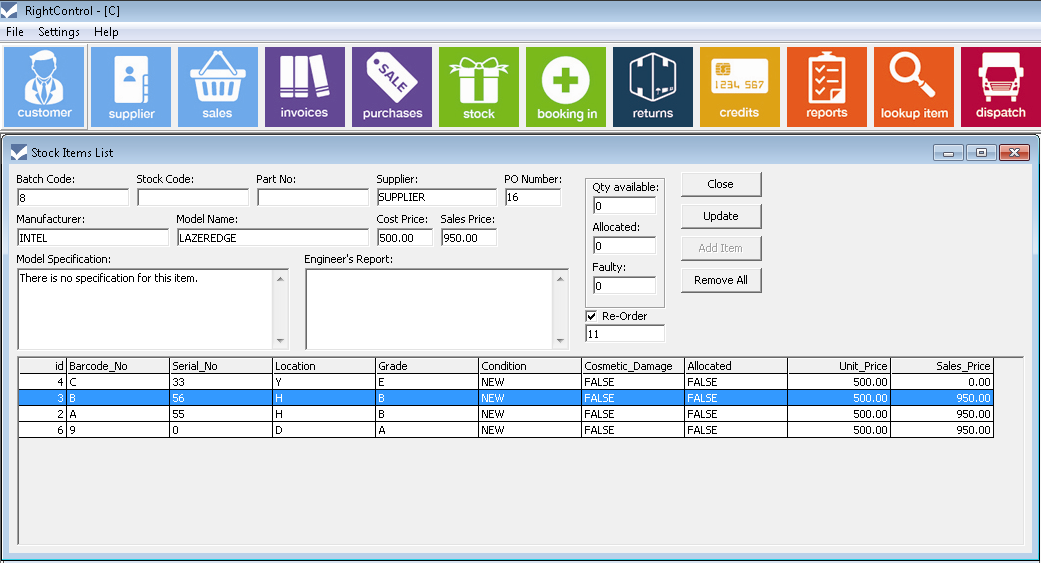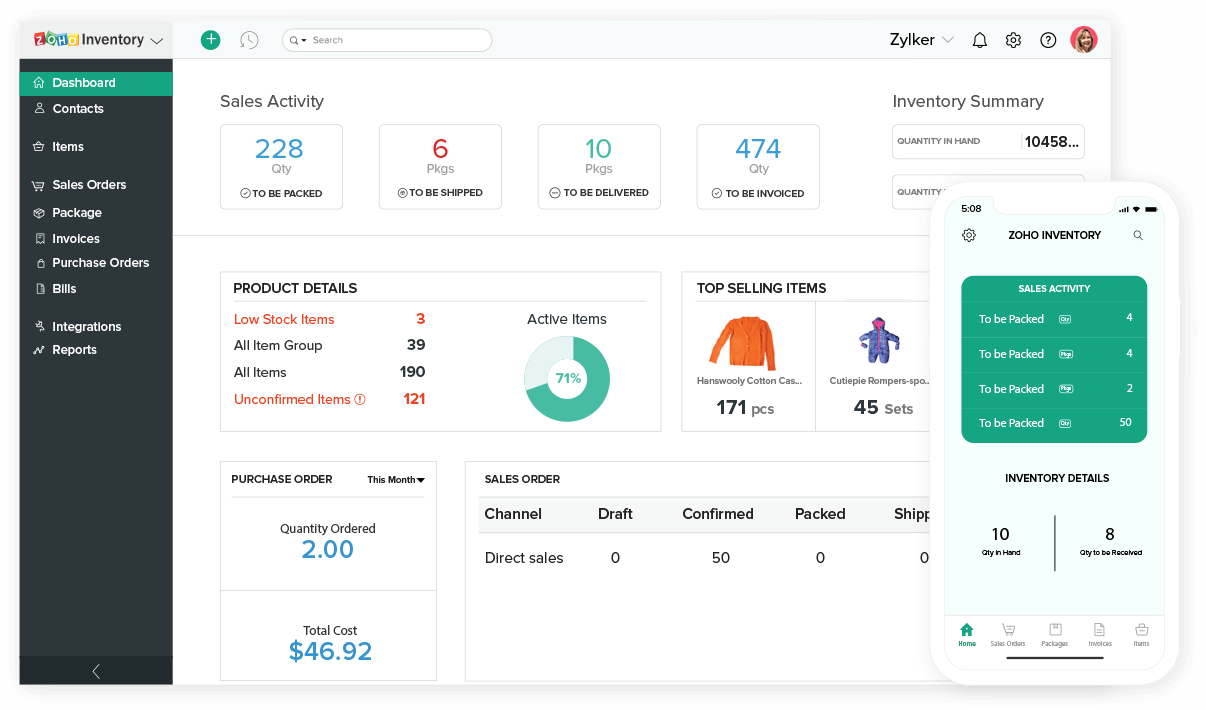In today’s competitive business landscape, small businesses need every advantage they can get. Small business accounting software with inventory management capabilities offers a powerful solution to streamline operations, enhance efficiency, and gain a competitive edge.
This comprehensive software empowers small businesses to manage their finances and inventory seamlessly, unlocking a world of benefits that can transform their operations.
Overview of Small Business Accounting Software with Inventory Management

Small business accounting software with inventory management capabilities offers a comprehensive solution for businesses to manage their financial and inventory operations efficiently. These software solutions streamline accounting processes, including invoicing, expense tracking, and financial reporting, while also providing robust inventory management features.
By integrating accounting and inventory management functions, small businesses can gain real-time visibility into their financial performance and inventory levels. This allows them to make informed decisions, reduce operational costs, and improve customer satisfaction.
Key Features of Small Business Accounting Software with Inventory Management
- Financial Management: Invoice creation, expense tracking, bank reconciliation, financial reporting
- Inventory Management: Inventory tracking, stock adjustments, reorder point management, multi-location inventory
- Reporting and Analytics: Profit and loss statements, balance sheets, inventory reports, sales analysis
- Integration with Other Systems: CRM, e-commerce platforms, payment gateways
- Cloud-Based Access: Accessible from anywhere with an internet connection
Benefits of Using Small Business Accounting Software with Inventory Management
- Improved Accuracy: Automated accounting and inventory processes reduce errors and improve data integrity.
- Time Savings: Streamlined processes free up time for business owners to focus on other important tasks.
- Enhanced Visibility: Real-time access to financial and inventory data provides better insights into business performance.
- Reduced Costs: Automated processes eliminate manual labor and reduce operational expenses.
- Improved Customer Service: Accurate inventory management ensures timely order fulfillment and reduces customer dissatisfaction.
Key Features of Small Business Accounting Software with Inventory Management
Choosing the right small business accounting software with inventory management capabilities is crucial for streamlining your financial operations and optimizing your inventory management. Here are the key features to look for:
Accounting Features:
- Invoicing: Easily create and send professional invoices to customers.
- Expense Tracking: Record and categorize business expenses accurately.
- Financial Reporting: Generate comprehensive financial reports, including profit and loss statements, balance sheets, and cash flow statements.
Inventory Management Features:
- Stock Tracking: Keep track of inventory levels in real-time.
- Purchase Orders: Manage purchase orders and track the status of incoming inventory.
- Inventory Valuation: Use different valuation methods (e.g., FIFO, LIFO) to determine the value of your inventory.
Integration with Other Business Systems:
- CRM: Integrate with customer relationship management (CRM) systems to manage customer data and track sales activities.
- E-commerce Platforms: Connect with e-commerce platforms to automate order processing and inventory updates.
Benefits of Using Small Business Accounting Software with Inventory Management
Small businesses can gain significant advantages by implementing accounting software with inventory management capabilities. These benefits include improved accuracy and efficiency in financial management and inventory tracking, enhanced visibility and control over stock levels, reduced risks of stockouts and overstocking, and improved customer satisfaction through accurate order fulfillment.
Improved Accuracy and Efficiency
Integrated accounting and inventory management software eliminates manual data entry, reducing errors and saving time. Automated inventory tracking features provide real-time updates on stock levels, ensuring accurate financial reporting and inventory records.
Enhanced Visibility and Control
Centralized inventory management provides a comprehensive view of stock levels across multiple locations or warehouses. Businesses can easily track inventory movements, adjust stock levels, and make informed decisions based on real-time data.
Reduced Risk of Stockouts and Overstocking
Inventory management software helps businesses maintain optimal stock levels. Automated alerts notify users of low stock levels, preventing stockouts and potential lost sales. Advanced forecasting tools assist in predicting demand and optimizing inventory levels, reducing the risk of overstocking and associated storage costs.
Improved Customer Satisfaction
Accurate inventory tracking ensures that businesses can fulfill customer orders promptly and efficiently. Real-time inventory updates prevent overselling and backorders, leading to improved customer satisfaction and increased sales.
Considerations for Choosing Small Business Accounting Software with Inventory Management
Choosing the right small business accounting software with inventory management is crucial for efficient business operations. Several factors should be considered to ensure the software aligns with your specific needs and goals.
Here are some key considerations to guide your decision-making process:
Business Size and Industry
- Consider the size of your business and the number of transactions you process daily.
- Different industries have unique inventory management requirements, such as tracking perishable goods or managing multiple warehouses.
Accounting and Inventory Management Needs
- Determine the specific accounting and inventory management features you require, such as invoicing, expense tracking, and inventory valuation methods.
- Assess the complexity of your inventory management needs, including the number of SKUs, storage locations, and inventory turnover rates.
Budget and Cost Considerations
- Establish a budget for your accounting software and consider the ongoing costs, such as subscription fees, implementation, and training.
- Evaluate the value proposition of different software options and choose the one that provides the best features and support for your budget.
Ease of Use and Support, Small business accounting software with inventory management
- Ensure the software is user-friendly and intuitive for your team to use, reducing training time and minimizing errors.
- Consider the level of support provided by the software vendor, including online documentation, tutorials, and technical assistance.
Best Practices for Using Small Business Accounting Software with Inventory Management

Effectively utilizing small business accounting software with inventory management can streamline operations, enhance accuracy, and optimize inventory levels. Here are some best practices to ensure you get the most out of your software:
Setting Up the Software Correctly
– Ensure accurate data entry by setting up chart of accounts, inventory items, and vendor information meticulously.
– Configure inventory tracking methods (FIFO, LIFO, etc.) that align with your business practices.
– Establish user permissions and access levels to maintain data integrity and prevent unauthorized changes.
Maintaining Accurate Inventory Records
– Regularly conduct physical inventory counts to reconcile with system records and minimize discrepancies.
– Implement a system for tracking inventory movements, including receipts, sales, and adjustments.
– Utilize barcode scanners or RFID technology to automate inventory tracking and reduce errors.
Utilizing Reporting and Analytics Features
– Generate regular inventory reports to monitor stock levels, identify slow-moving items, and optimize purchasing decisions.
– Use analytics to track inventory turnover, profitability, and other key metrics.
– Leverage reporting capabilities to identify trends, forecast demand, and make informed inventory management decisions.
Integrating with Other Business Systems
– Integrate your accounting software with your e-commerce platform to automate order processing and inventory updates.
– Connect with your CRM system to track customer purchase history and tailor inventory levels accordingly.
– Explore integrations with other business applications, such as warehouse management systems, to streamline operations and improve efficiency.
Examples of Small Business Accounting Software with Inventory Management
Small businesses can streamline their accounting and inventory management processes by utilizing specialized software. Here are some popular options:
| Software Name | Key Features | Pricing | Description |
|---|---|---|---|
| QuickBooks Online | – Inventory tracking – Invoice creation and management – Financial reporting – Mobile access |
Starting at $25/month | A comprehensive solution for small businesses with a wide range of accounting and inventory management features. |
| Xero | – Multi-currency support – Project tracking – Bank reconciliation – Inventory management |
Starting at $30/month | A cloud-based accounting software with robust inventory management capabilities for small businesses. |
| FreshBooks | – Simple and user-friendly interface – Invoice and expense tracking – Time tracking – Inventory management |
Starting at $15/month | An affordable option for small businesses looking for an easy-to-use accounting and inventory management solution. |
| Zoho Books | – Multi-user access – Customizable reports – Project accounting – Inventory management |
Starting at $19/month | A comprehensive accounting software with inventory management features tailored for small businesses and startups. |
| Sage Business Cloud Accounting | – Advanced inventory management – Order processing – Purchase order management – Financial reporting |
Starting at $50/month | A feature-rich accounting software with inventory management capabilities designed for growing businesses. |
Conclusion

By embracing small business accounting software with inventory management, businesses can unlock a new era of efficiency, accuracy, and control. With these tools at their disposal, small businesses can confidently navigate the complexities of modern commerce and achieve their full potential.
FAQ Section
What are the key benefits of using small business accounting software with inventory management?
Improved accuracy and efficiency, enhanced visibility and control over inventory levels, reduced risk of stockouts and overstocking, improved customer satisfaction through accurate order fulfillment.
What are the essential features to look for in small business accounting software with inventory management?
Accounting features (e.g., invoicing, expense tracking, financial reporting), inventory management features (e.g., stock tracking, purchase orders, inventory valuation), integration with other business systems (e.g., CRM, e-commerce platforms).